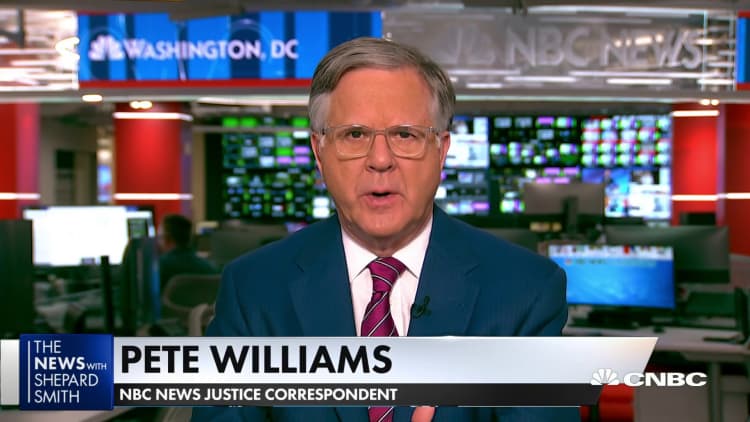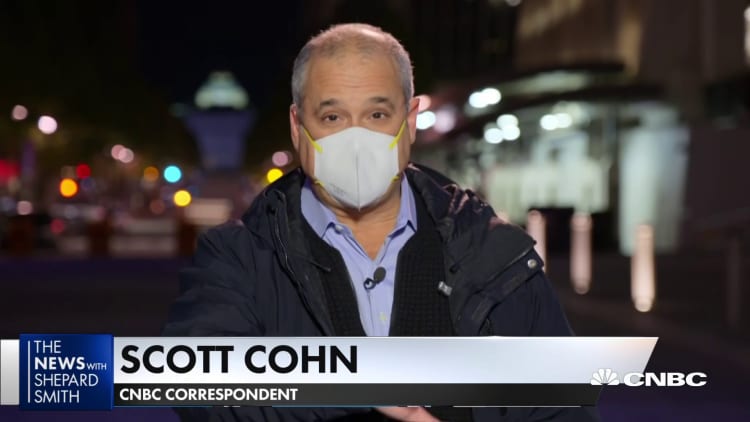Election law experts, including one of President George W. Bush's top campaign attorneys, say the Trump campaign's current lawsuits lack compelling evidence and are not likely to change the outcome of the 2020 contest.
Asked for comment on President Donald Trump's claims of illegal absentee and mail-in ballots, former Bush attorney Barry Richard said none of the campaign's current suits appear to be supported by evidence.
"I think the lawsuits filed so far are entirely without merit and will not be successful," Richard, who served as a lead attorney for the Republican candidate during the 2000 recount in Florida, wrote in an email.

The remarks from Richard, who successfully advised the Bush campaign through one of the closest U.S. elections in modern history, came as the Trump campaign turned to the nation's courts to challenge balloting procedures in several battleground states.
The Trump team has brought cases in Pennsylvania, Michigan, Nevada and Georgia. NBC called Michigan for former Vice President Joe Biden. Election results have been too close to call in the three other states.
Though the suits vary slightly by state, some Republicans have repeatedly questioned the integrity of absentee and mail-in voting procedures without evidence of the widespread voting fraud they allege.
The campaign has also brought cases over deadlines for accepting ballots and to grant GOP poll watchers greater access to official counting sites. A suit in Nevada asserts that an increase of mail-in ballots caused an illegal counting of ballots from people who are dead or do not technically reside in the state.
But Trump's lawsuits, if successful, could threaten Biden's lead in a handful of battleground states where the margin between the two men is as thin as a few thousand votes.
Legal experts say if Trump has any hope in court, it's in a Pennsylvania case at the Supreme Court. It involves a state Supreme Court decision from earlier this year that allowed the counting of mail-in ballots received three days after Election Day.
Even if the U.S. Supreme Court agreed to allow the Trump campaign to block Pennsylvania ballots received after Nov. 3, Republicans would need the final count of mail-in ballots received during the three-day extended window to exceed the state's current margin between the two candidates.

Samuel Issacharoff, an election law professor at New York University School of Law, expressed doubt over the president's odds of success with the high court as well as Trump's likelihood of election success even if the U.S. Supreme Court sided with his campaign.
"So far, there is no legal strategy emerging from the Trump camp. They are claiming fraud in states where they are behind, but have no overall legal theory," Issacharoff wrote. "The only sustained legal issue they have identified is the counting of absentee votes in Pennsylvania that come in after Election Day. So far those have not been counted, even though the state Supreme Court said they could be."
"But it looks like Pennsylvania will shift pretty decisively to Biden in the next few hours. So, even this point, does not alter the outcomes," he added Friday. Biden had taken the lead earlier in the day.
"The litigation seems designed to keep up the rhetorical stance of the election having been fraudulent. The cases themselves seem half-hearted," Issacharoff wrote.
Still, Trump's appeal to the court system reached a fevered urgency on Friday, when the president took to Twitter to attack officials in Pennsylvania.
"We have to go back to the state level and how this morass came to be in the first instance. The Governor, Wolf, and the State Supreme Court, flagrantly violated the Constitution of the U.S.," Trump wrote on Twitter.
"They just ignored that, ignored the Constitution. Now we bring it down to the counting houses, and outrageously, observers, who are the sentinels of integrity & transparency, were excluded," he added. "Pennsylvania has conducted itself in a horrible lawless way, and ... hopefully this will be corrected at the Supreme Court of the United States."
A judge ruled on Thursday that election observers of both parties could have greater access to counting sites in Pennsylvania after the Trump campaign said they were not granted sufficient access.
As of early Friday morning, Biden is projected to win 253 electoral votes, 17 short of the 270 needed to win, according to NBC News. Pennsylvania is worth 20 electoral votes, which would put Biden over the top to win the election.
Despite Trump's attacks, legal experts such as Richard and Issacharoff say that his campaign's efforts are unlikely to have a material impact.
Rick Pildes, another NYU Law professor who worked with Issacharoff on Barack Obama's campaign for president, echoed his colleague and reiterated Trump's tough odds in court.
"Most of the claims are not about invalidating ballots at all, but in demanding greater transparency for the counting process," Pildes wrote in an email.
"Even if some of those claims win, as one did in PA yesterday, that only means that legitimate ballot watchers will be able to get closer to where the ballot processors are. It does not change the validity of any votes," he added.


